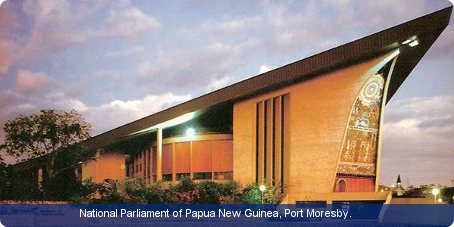Government
- Overview
- History

Papua New Guinea is a constitutional monarchy which recognises Queen Elizabeth II as head of state. She is represented by a governor-general who is nominated by parliament and who serves for a term of six years.
The prime minister is the head of the national government, which is vested with executive power. Following parliamentary elections, the leader of the majority party or coalition is usually appointed prime minister by the governor general, who acts in accordance with a decision of parliament. The National Executive Council (cabinet) is appointed by the governor-general on the prime minister’s recommendation.
Legislative power is vested in both the government and the unicameral parliament. The parliament consists of 109 members, and elections are held every five years with universal adult suffrage. Each elector has two votes. One vote is used in the 89 ‘open’ constituencies (from 2007, voting on the basis of proportional representation), the other in one of the 19 provincial constituencies or the capital district, from each of which a representative is elected who acts as a governor in the province or capital district.
Parliament can only hold votes of no confidence in the prime minister when more than 18 months has elapsed since an election and at least 12 months before a new election is due.
Government is structured at two levels: national and provincial. The 19 provincial governments can levy taxes and are responsible for local education, industry and business development, while national government is responsible for national finance, infrastructure, defence, foreign relations, trade, schools and hospitals.
Since 2003 senior civil servants are appointed by the Public Service Commission.
Constitutional safeguards include freedom of speech, press, worship, movement and association. The judiciary is independent of the executive and legislature. The judicial system was based on British models, but is in accord with traditional values, particularly with respect to customary land rights.
The Supreme Court is both the final court of appeal and the constitutional court. The National Council has original jurisdiction in the most serious civil and criminal cases. Appeals from the National Court are heard by the Supreme Court. The lower courts comprise district, local and village courts (magistrates’ courts dealing with certain customary matters). There are also special courts concerned with family law, customary land disputes and civil cases relating to the mining sector.

Papua New Guinea is an archipelago in Oceania. It comprises the eastern half of the island of New Guinea (the western half is part of Indonesia), together with the islands of New Britain, New Ireland, Bougainville and 600 smaller islands.
Melanesian people inhabited the area from 3000 or 2000 BC, living in groups isolated by dense forest. To this day, more than 800 languages are spoken in Papua New Guinea, marking it out as one of the world’s most linguistically heterogeneous nations.
Spanish and Portuguese sailors sighted the land in the early sixteenth century. In 1885 the eastern half of the island of New Guinea was divided between the UK (south) and Germany (north). The southern parts were formally annexed by Britain in 1888 and became British New Guinea. In 1906, Australia took over British New Guinea and renamed it a year later as the Territory of Papua. In the First World War Australia occupied German New Guinea and in 1920 Australia received this former German territory (now named New Guinea) as a mandate of the League of Nations.
Under the Papua and New Guinea Act of 1949, the two parts were united for administration as the Territory of Papua and New Guinea and put under United Nations International Trusteeship. Australia continued to administer the territory.
Papua New Guinea became self-governing at the end of 1973; in 1975 it became fully independent. The greatest threat to stability since independence has been the attempted secession of the island of Bougainville. In 1990 a group calling itself the Bougainville Revolutionary Army (BRA) led a movement calling for secession from Papua New Guinea. By 1994 some secessionist leaders were becoming dissatisfied with the hard-line stance of the BRA. The Bougainville Peace Agreement was eventually signed in August 2001, providing for special autonomous status for Bougainville and the promise of a referendum on independence to be held between 2015 and 2020.
The political life of Papua New Guinea is one of diversity and is characterised by a tradition of fluid coalitions. A large number of candidates (more than 2,700 in 2007) contest the 109 seats at general elections. Prime ministers have tended not to serve out a full term between elections, though they have often been returned to power later.
The general election that commenced in mid-June 2002 had to be suspended for four weeks because of civil unrest. The National Alliance and its multiparty coalition won a parliamentary majority and Alliance leader Sir Michael Somare became prime minister for the third time.
In December 2010, Somare stepped aside in order to face a Leadership Tribunal hearing on allegations of financial mismanagement. Following a two-week suspension from office by the Tribunal, Somare began a long period of medical treatment in Singapore. In April 2011, amid increasing concerns that Somare would never be able to resume office, a parliamentary vote declared the office of prime minister vacant. The People’s National Congress leader, Peter O’Neill, was elected as prime minister.
O’Neill won a parliamentary vote of confidence in December 2011, after the Supreme Court had ruled that Somare be reinstated, and parliament then passed retrospective legislation to justify O’Neill’s position.





